

We all imagine ourselves becoming a "master teacher". We bring to mind images of enthralled students enthusiastically participating in our lessons. We imagine our hard work and intensive study paying off in a highly rewarding series of years leading up to our retirement.
However, we can't do our job and reach the highest levels of professional practice if the kids won't attend to the lessons and be civil in their interactions with others. We can't teach the material (and kids can't learn it well) if our behavior management skills are underdeveloped. What might be the most crucial aspect of teaching (with respect to our career satisfaction and longevity), is the most complex and difficult to master. Proficiency in behavior management, unlike the teaching of subject matter, or interventions for students with learning disabilities, involves much, much more than following the procedures stated in the manual. Competent management of behavior involves developing excellence in multiple areas of "discipline": classroom design and arrangement; setting up and running a comprehensive classroom management system; counseling and communication skills; instructional practices for teaching new behaviors; being able to develop positive emotional bonds with students; knowing when and how to modify the vast number of procedures that we have placed in our "behavior management tool kit", and so much more.
When most of us entered teaching, we probably held the view reflected in what is known as "The Teacher's Motto". It goes something like this:
"A hundred years from now, some things won't matter; how much money was in my bank account, the size of the house in which I lived, or the kind of car I drove around...but the world may be a better place because I was important in the life of a child."
So why do so many teachers leave the field, or, if they stay, get mean and nasty in their interactions with kids? Sadly, a great many of them weren't "making a difference" because of a lack of skill in behavior management. They were less satisfied then they expected to be with their teaching careers. That lack of skill in managing student behavior created a gap between the image of the master teacher they had hoped to become, and the level at which they found themselves performing. They weren't making the positive impact on kids that they had hoped to make.
Indeed, how well you manage student behavior is crucial to your success as a teacher. The behavior that is exhibited in your classroom affects how administrators, colleagues, kids, parents, and YOU view your competence as a teacher. "Problems with discipline" is the number one reason that administrators fail to rehire teachers or award tenure. It is the main source of career-related stress as reported by teachers, and the number one reason that former teachers report for having left the profession.
The source of the problem is well known: The vast majority of teachers are sent into the classroom with absolutely NO training in managing student behavior. Others have been told by professors that if they implement well planned lessons based on a strong curriculum, the kids will sit with their hands folded and say "Teacher, please tell me more." While that practice certainly helps, we need more in our behavior management bag of tricks. Because the typical teacher has received little or no practical guidance in this area that is so vital to teaching success and satisfaction, many eventually begin to listen to tired and misguided educational folklore like:
-"Don't smile until Christmas." (or Chanukah, Kwanza, Ramadan, Chinese New Year)
-"Keep those brats under your thumb, and let `em know who's boss."
These negative views on how to manage the behavior of youngsters is in stark contrast to the views held by individuals who have just entered teacher training programs. When asked why they wanted to become teachers, the number one answer was something like: "I love children and want to help them." Noble stuff. And don't kid yourself; Teaching is a heroic act. We believe that we have the ability to make a difference in the lives of children, and thus can make a positive, long term impact on society. Our influence gets passed down through the generations, giving our acts, if not our name, a degree of immortality.
How do we "keep the faith" though when the threat from behavior problems to career satisfaction is greater today than ever before? The reason for the increase of frequency and intensity of behavior problems is open to debate. Depending on who you talk to, it is blamed on any of the following reasons (and more):
-abusive parenting
-poor parenting
-decay in family structure and values
-anonymity in large communities and schools
-loss of the influence of elders on youngsters
-psychological disturbances
-song lyrics
-popular culture
-exposure to societal violence
-failure of the juvenile justice system
-poverty
-romantic breakups
-availability of weapons
-boredom
-racial tensions  -invasion of body space
-invasion of body space
-inability to handle frustration![]()
-drugs and alcohol
-computers ![]()
-televised wrestling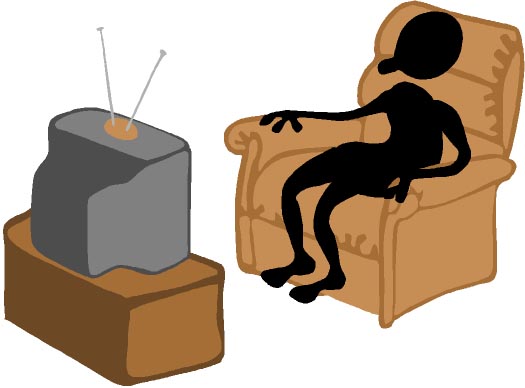
-video games
-a bad swimmer in the gene pool Q: How do you tell a female chromosone from a male chromosone? A: Pull off their genes (Jeans)
-politicians/the political system
-big business
-chemicals
-radiation (from cell phones or the depletion of the ozone layer)
-food additives
-medications
-the weather 

-sun spots
-phases of the moon
-talk shows on TV ![]()
-groups in society who fail to promote high achievement among their children
-failure of parents to support the efforts/interventions of the schools
-failure of the schools to work cooperatively and positively with parents
-a "factory style" of educating children
-an outdated mode of teaching
-lawyers
-lead in paint  -diet
-diet
*Two teachers are sitting in the faculty cafeteria. One comments on the healthy meal of the other.
The second one replies "You are what you eat." The first teacher then says "Well in that case,
most of my students are four foot boogers."
-space aliens
-Elvis impersonators
-the President
-mimes (my personal belief)
*If you shoot a mime, do you need to use a silencer?
*If a mime falls in the forest, does he make a sound?
*If the police arrest a mime, is it necessary to inform him of his right to remain silent? 
 -the devil
-the devil
-learning styles that clash with teaching styles
and any other of thousands of reasons...some more prominent or likely than others.
| Click here for cartoon |
Whatever the reason(s) might be, teachers need to be more skilled in behavior management than ever before. Let's take a look at how a lack of skill in behavior management affects career longevity and satisfaction. Typically, poor behavior managers progress through a four stage process.
THE FOUR STAGES OF TEACHING
(related to behavior management skills)
(You can watch a videotape on the four stages by returning to the BehaviorAdvisor.com home page, clicking on "Free podcasts & videos", and scrolling down to "Dr. Mac's Mountain")
Our present proficiency in the use of positive and effective behavior management strategies has an enormous impact on our success and satisfaction with teaching, the motivation and achievement of our students, and our career longevity. Our knowledge and skill with regard to managing student behavior determines whether and how quickly we arrive at the career stage of "master teacher". (Described below and then illustrated later in a "PowerPoint" presentation).
STAGE 1 THE SHINY NEW TEACHER
As the first day of our new career approaches, we're nervous, but believe deep inside that we are going to have a great year. We've studied hard under professors with Ph.D.'s and/or plenty of real life experience. We have the skills, and we also have the personal approach
. We're going to be different than those teachers who were so rigid back when we were in school. We're going to love our students,...and they're going to love us. We're going to create a wonderful, nurturing, supportive, and productive learning environment.
We're going to be different than those teachers who were so rigid back when we were in school. We're going to love our students,...and they're going to love us. We're going to create a wonderful, nurturing, supportive, and productive learning environment.
STAGE 2 SHELL SHOCK

After an initial two or three day "honeymoon" period, the students' behavior starts to take a turn for the worse. 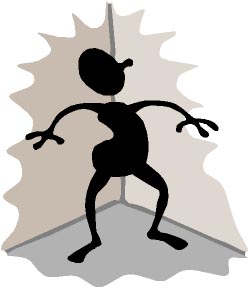 The kids have been excited about the start of the school year too, and vowed to do well. Some kids however, are unable to manage themselves for very long. They start to test the rules to determine limits and discover exactly how strict you are going to be about that pencil sharpening rule or "Keep hands, feet and objects to yourself" regulation. Your attempts to reason with the youngsters aren't having any impact. You find your lessons disrupted by some students while others complain about their misbehavior. You're having a heck of a time trying to keep structure and order.
The kids have been excited about the start of the school year too, and vowed to do well. Some kids however, are unable to manage themselves for very long. They start to test the rules to determine limits and discover exactly how strict you are going to be about that pencil sharpening rule or "Keep hands, feet and objects to yourself" regulation. Your attempts to reason with the youngsters aren't having any impact. You find your lessons disrupted by some students while others complain about their misbehavior. You're having a heck of a time trying to keep structure and order. 
Being unable to teach at the level you (and others) expect, you're frustrated and humiliated. This is the stage when teachers place brown wrapping paper over the window on the door so others can't look in (We write "Please knock and wait before entering. Learners at work."although those who walk by say "Gee that doesn't seem like the sound of learning to me.")
The problems don't stay behind at school. They follow you home. You think about your problems day and night. 
While you're not working in the salt mines or operating heavy machinery, you drag yourself into your abode and fall onto the couch...absolutely exhausted. In time, you manage to pull yourself up to plan for the next day, hoping in vain that your potentially interesting lessons will recapture the pupils' attention. When the time comes to rest your weary head, it's difficult to fall asleep. When you do so, it is restless. You toss and turn, seeing certain youngster's faces in your dreams (These are true night terrors!), and wake up strangling your pillow. Your first words echo those of some of your students..."I don't wanna go to school. I don't wanna to go to school."
| Click on this box to go to a related cartoon |
You've just entered the early stages of "burnout". The kids (and others) are demanding too much of you. Emotionally, you just can't give anymore. You're worn out and feeling incompetent. You doubt whether you made the correct career choice. You think that maybe you don't have what it takes to be a teacher.
| Click on this box for advice to follow when you get stressed out |
At this point, you have several choices:
a) You can continue on as an ineffective teacher (Not recommended).You have to much promise to give up your life's dream)
b) You can take your friend's and family's advice and go into sales. (Not recommended). While surveys show that those who leave the teaching profession report being paid more and under less stress, they also report a sense of loss. They had the heart of a teacher, and now there is a "hole in the soul".
c) You can get out of the classroom, but stay in education by getting an advanced degree. Now you can become an administrator who evaluates the disciplinary performance of others, sends the youngsters who just arrived at the office back to their class, or suspends any kids who create too many problems. Or maybe you'll go into guidance counseling so that you only have to deal on a one- to-one or small group basis with kids. Or maybe you go on to earn a Ph.D., become a professor specializing in kids with behavior disorders, and set up a web site claiming to have never-fail techniques for working with misbehaving kids...all without ever having to actually work with them. (Oops! Have I just incriminated myself?)
d) You can give up your ideals and values, taking the advice uttered in the teacher's lounge (OH NO!!). You decide to quit being kicked around (figuratively...I hope), and steel yourself to "get tough" and "show `em who's boss". You decide to move into stage 3 (REALLYnot recommended).
e) Skip to STAGE 4 (Highly recommended...but read about stage 3 first)
STAGE 3 THE DISCIPLINE DICTATOR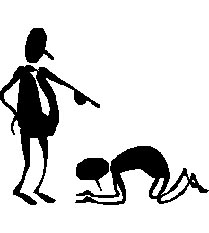
When teachers haven't yet mastered positive and effective behavior management practices they often turn to the "dark side". Like Darth Vader in the Star Wars movie, they treat their underlings in quick and negative ways. When in the teachers lounge (I've yet to see a room for teachers deserving of the term "lounge") they often refer to another movie, bragging about their "7 Dwarfs metamorphosis": "When I came to teaching, I was Dopey. Now I'm GRUMPY!"
I meet teachers stuck in this stage at many of my workshops. These are the ones who communicate to me (in disguised wording) "Hey McIntyre, if you want to be of any use to me today, give us better ways to intimidate these errant urchins. Give me toxic strategies that will strike fear deep into their deviant little hearts. 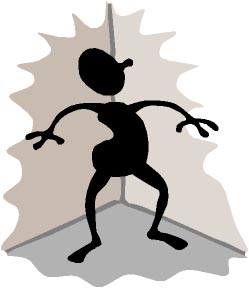 I want my former students to tell the new ones: `Be afraid. Be very afraid'." They deny that they need to change their ways, thus proving the old statement: "Denial (Da Nile) ain't just a river in Egypt."
I want my former students to tell the new ones: `Be afraid. Be very afraid'." They deny that they need to change their ways, thus proving the old statement: "Denial (Da Nile) ain't just a river in Egypt."
| Click here for cartoon about stage 3 teacher intervention |
Certainly things seem to be better than when you were in stage 2. There is no more pleading voice and timid grin. You draw the line and you get compliance (even though it's superficial respect and kids are only obeying out of fear).

But despite trying to subdue it, something still claws at your insides (like that pork sausage you ate for lunch at the school cafeteria)... its that desire to be a master teacher. In this stage, you've become the teacher you swore you would never be. You're doing things you never imagined you would ever do to kids: exacting polite and respectful behavior in impolite and disrespectful ways; and demanding appropriate behavior via inappropriate actions. You're doing things that you won't allow your kids to do (e.g., yell, berate, touch in a non- respectful manner). Let's face it, the love is gone and you're just showing up for the paycheck.
|
My third grader has been very articulate in her assessment of the third grade teachers in her school. She describes them as being "harsh". My daughter is not a problem in class, but she is frightened by the negativity. She shows great compassion for the children who suffer from the punitive management systems. Excerpted from an e-mail to Dr. Mac from a parent, describing the hurt and anxiety experienced by students when they are in the classrooms of stage 3 teachers. She is engaged in actions within her school district to require teachers to engage in positive behavior management. |
| "You do not lead by hitting people over the head...that's assault, not leadership." Dwight D. Eisenhower, 34th President of the United States; Allied Commander during World War II. |
Why is it (for stage 3 types) that "punish them hard" is the best way to deal with everyone except ourselves? Why is it that they do things to kids that would cause us to file a union grievance if a supervisor did them to us?
I've heard these stage 3ers tell me "I was punished hard, and I turned out alright" (a statement I question when I watch them deal with student behavior). However, for those who did turn out "alright", it probably wasn't due to the punishment, but rather the conditions that surrounded it: an adult who did it with regret; an adult who when punishing, told them that they were being punished because they were capable of doing better; the positiveness of the punisher outside of those punishing moments, etc.
Teachers in stage 3 talk about how the "mean teachers" that they had in school who motivated them to do the work, achieve, and behave well. However, wouldn't they have advanced even more so under the guidance of a skilled and supportive teacher?
That said, stage 3 teachers...
At this point, you have two choices:
a) Keep the ball and chain on your professional growth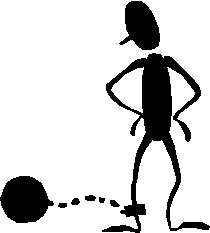 , staying mean and justifying your actions by thinking of your students as "losers" and claiming "It's the only thing they understand." (Not recommended) You can also recruit new and struggling teachers who drop by the teacher's lounge where you and other burned out instructors go to complain and criticize. You certainly don't want any more skilled and well liked teachers in your building, reminding you of what you had hoped to be. If you decide to remain in this stage, purchase a "shock collar"... not for the kids... FOR YOU when you think negative thoughts about your pupils. Then hook the electrode to the seat of your pants.
, staying mean and justifying your actions by thinking of your students as "losers" and claiming "It's the only thing they understand." (Not recommended) You can also recruit new and struggling teachers who drop by the teacher's lounge where you and other burned out instructors go to complain and criticize. You certainly don't want any more skilled and well liked teachers in your building, reminding you of what you had hoped to be. If you decide to remain in this stage, purchase a "shock collar"... not for the kids... FOR YOU when you think negative thoughts about your pupils. Then hook the electrode to the seat of your pants.
| Click here to see cartoon showing how stage 3 teacher views kids |
b) You realize that behavior management is not a hammer ![]() and nail scenario (It's more like splicing wires). You drop your belief in the authoritarian saying: "If a hammer doesn't work, get a bigger hammer." (e.g.,., "Oh yeah!? A zero doesn't bother you? Then you're getting a "double zero" young man."), and stop using more of what already isn't working. Instead, you hang your hat on the advice from the U.S. Cavalry: "If your horse dies, dismount.". In other words, "If it ain't working, stop doing it!"
and nail scenario (It's more like splicing wires). You drop your belief in the authoritarian saying: "If a hammer doesn't work, get a bigger hammer." (e.g.,., "Oh yeah!? A zero doesn't bother you? Then you're getting a "double zero" young man."), and stop using more of what already isn't working. Instead, you hang your hat on the advice from the U.S. Cavalry: "If your horse dies, dismount.". In other words, "If it ain't working, stop doing it!"
| Click here for what NOT to do when your horse dies |
You start again to look for answers and seek mentors. You're now seeking solutions instead of blame. You ask questions of skilled colleagues and drop by their classrooms during your planning period to observe them and pick up tips that you'll use with the kids. You read good books on behavior management (recommended in a link on BehaviorAdvisor.com), and attend local conferences. You work to convince the district to hold more staff development workshops on behavior management. Heck, you even decide to take a classroom management class at the local college. Last, you keep dropping back to Dr. Mac's web site (and other good web sites recommended in a link therein) to refresh your memory and look for any new ideas that might have been posted.
Dang! You're feeling enthused again. Things are improving. You've realized that certain practices (e.g., lecturing, threatening, arguing, shaming, labeling, blaming, preaching, ordering) are counterproductive and roadblocks to optimal learning. You're discovering and trying more effective and benificial interventions. You're on your way to stage four, that master teacher stage.
STAGE 4 THE SKILLED & CARING BEHAVIOR MANAGER
You're there! You always knew that you could do it. The only regret is that you wish you had started your on-the-job study much earlier. Now you're familiar with "the 80/15/5 rule" (Any one technique works great with 80% of kids, somewhat with 15% of pupils, and not at all with 5% of your students) and realize that you need many behavior management tools, not just a hammer. As Mark Twain said: "To a man with a hammer, everything looks like a nail." You've moved beyond that stage. Now you're leading rather than pushing. You're talking TO kids, not ATthem. You've come to realize that the only way to break your students' negative behavior patterns is to break your own first. Now when kids give you a fun house mirror version of appropriate behavior, or are grating on your last good nerve like #6 sandpaper, you're demanding (yet friendly and supportive), firm (yet fair), and NEVER do anything you wouldn't want done to you. You're no longer ashamed and embarrassed of your actions. You're rightfully proud of yourself.
 Remember: Use your super powers only for good!
Remember: Use your super powers only for good!
With entry into stage 4 you've come to know the perks of being a good behavior manager. You now sleep better at night and wake refreshed. Your first words upon arising are "Carpe diem" (seize the day). And boy, it feels great when the kids listen and achieve! You're teaching with confidence and charisma. Your sparkling personality surfaces, and you have enough energy left over at the end of the day to say "Carpe noctum" (seize the night).
Why not go to stage 5 (the wise mentor)? Now that you're so darned good, it's time to help someone who is struggling at levels 2 or 3. .gif) Befriend that new teacher (Remember how you wished for helpful colleagues in your first couple of years on the job?) or tell that crotchety colleague of yours to stop complaining and do something positive about it. Share the wisdom. If not you, who?
Befriend that new teacher (Remember how you wished for helpful colleagues in your first couple of years on the job?) or tell that crotchety colleague of yours to stop complaining and do something positive about it. Share the wisdom. If not you, who?
Traits of a Stage 5 Teacher
Order, limits, firmness and kindness...the qualities of a positive and effective classroom. However, comprehensive classroom management doesn't just happen. In the words of Haim Ginnott (1978): "Discipline is a series of little victories, not something that occurs overnight." It takes thoughtful planning, implementation and maintenance. Well developed plans implemented by a positive and respectful teacher result in well managed classrooms that are conducive to learning. Skilled behavior managers foster a classroom climate in which kids feel valued and motivated.
If you're not yet a consummate behavior manager, here's how to discover the reason why: Look in the mirror. In that mirror, you'll also find the solution to your problem. With reflective experience and study, you'll soon be turning confrontations into "carefrontations". That outcome is necessary for many reasons. Educators no longer have the same coercive and intimidating consequences that were once available to them. What is left to our disposal today isn't half as bad as what some of our kids experience at home, and additionally, the law now requires that kids labeled as emotionally or behaviorally disordered receive "positive interventions". It's also necessary for our own emotional health. If you're coercing kids into behaving, it's time to give up the ghost. In the words of Bob Dylan, "The times they are a-changin`."
In ambiguous situations, kids look to us for guidance. We are like the banks of a river: Our behavior management skills guide our students' energy flow. If the banks are too weak, the undirected flow causes disaster. If the banks are too constrictive, the flow backs up and causes problems elsewhere. We can provide the guidance needed by always keeping the following principles in mind:
THE 10 DEMANDMENTS OF BEHAVIOR MANAGEMENT
1. Always treat youngsters with respect and preserve their dignity.
2. Always do what is in the students' best interests.
3. Seek solutions, not blame.
4. Model tolerant, patient, dignified, and respectful behavior.
5. Use the least intrusive intervention possible.
6. Connect with your students and build strong personal bonds with them.
7. Instill hope for success (otherwise there is no reason for kids to behave in your class).
8. NEVER do anything disrespectful, illegal, immoral, ineffective, bad for health/safety,
or you wouldn't want done to you.
9. NEVER give up on a student. Be perturbed with the actions of a student, but keep
believing in his/her ability to change for the better.
10. CATCH KIDS BEING GOOD . . . A LOT!!
(Check out the home page link on this topic to be sure you're doing it right)
So what's the next step in your positive progression? For starters, spend time at this web site (BehaviorAdvisor.com) and others recommended in our link titled "Other web sites". There is a lot of great information waiting for you to discover and implement. All you have to do now is to take the challenge. It's time to move to stage 4. C'mon, we know you've got it in you.
| CLICK HERE for a "PowerPoint" presentation on the material you just read. See if you can answer the questions and fill in the blanks. |
ACTIVITIES
1. If you are presently teaching, in what stage or stages of development do you find yourself? What's your plan for progressing higher?
2. Devise a definition of "behavior/classroom management". What does it encompass? What is it's purpose(s)? What are the components?
| Click on this box for one of many definitions |
3. Evaluate yourself using the "10 Demandments". Strive to change (if necessary) so that all 10 items describe your professional demeanor and practice. Is there an 11th demandment that should be added?
| Return to the Index of Strategies |
![]()
| (Please) Fetch Dr. Mac's Home Page |
Author: Tom McIntyre at www.Behavioradvisor.com 10/22/06